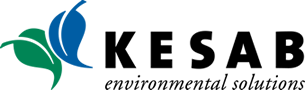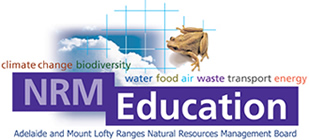
The NRM Education program is funded by the Adelaide and Mount Lofty Ranges Natural Resources Management Board with a vision of seeing all schools and preschools working with their communities to develop the knowledge, skills and values to live sustainably.
The NRM Education Central Team is hosted by KESAB environmental solutions.
This partnership is invaluable to the NRM Ed team whose primary role is to facilitate culture change in preschools, schools and the tertiary sector. Having access to knowledge and information around the latest in waste education has been a strong value add, enabling the NRM Education and Wipe Out Waste teams to better support (pre)schools, improving outcomes for both programs.
NRM Education Central Adelaide Fast Facts
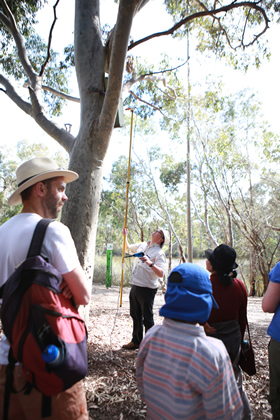
Steve Walker demonstrates use of a nest-box camera at a teacher training session
- 264 (pre)schools engaged with NRM Education, 204 of these are registered with the Australian Sustainable Schools Initiative in South Australia (AuSSI-SA). A total of 3830 students, children, staff and parents were directly involved in activities
- 99 schools and preschools documented sustainability initiatives in their School/Site Environment Management Plans (SEMP)
- 27 teacher training events; 590 educators from 89 schools and preschools attended
- 23 new resources developed, including ID charts, case studies, newsletter articles: embedding EfS, various flora and fauna articles
- 7 community talks and field days held, including Science Alive, the World Environment Fair and workshops about local frogs to promote the launch of the Frog-spotter App – an initiative that allows citizens to become the scientists. These activities had a reach of over 40,000 members of the community.
- 3 Youth Environment Council (YEC) of South Australia Events coordinated and facilitated – including 2016 Sharing and Celebration Forum, 2017 YEC Mentor Camp and a Sustainability Forum
- 9 out of 46 YEC representatives were supported by staff to develop a project to improve sustainability at their site
- 99 reports from 35 schools on progress towards embedding Education for Sustainability
- In partnership with the Australian Association for Environmental Education delivered the Biennial AAEE conference in Adelaide in 2016.
Embedding EfS into schools and preschools
Embedding Education for Sustainability (EfS) at a school or preschool is a process that involves patience, persistence and perseverance. It may begin with a few interested students, teachers or an inspired leader, seeking support from NRM Education staff who assist with identifying possible pathways and overcoming roadblocks. As the school or preschool progresses with its efforts to embed EfS, a greater proportion of children, staff and families are engaged in learning about and participating in sustainable practices.
NRM Education staff focus their efforts in (pre)schools where there is a desire to make change: those that are willing to develop a School Environmental Management Plan (SEMP), have leadership support, and are motivated to make sustainability a focus receive priority support from staff and are designated as Culture and People category of support.
In the last 12 months NRM Education has had a strong focus on collecting qualitative data to track how (pre)schools and their communities are transitioning to embed a culture of sustainability. Traditionally our reporting focus has been on capturing outputs – the number of sites we’ve had meetings with or delivered professional development to, or the output of sites such as the number of edible gardens planted or rainwater tanks installed.
Findings showed that by recording the project, the output, wasn’t capturing the rich stories of transformation that were taking place within the cultures of preschools and schools as they embedded sustainability. We were there for unable to communicate the diverse ways that our sites were achieving change and share outcomes with others. Figure 1, below, shows this shift in our Program’s thinking.
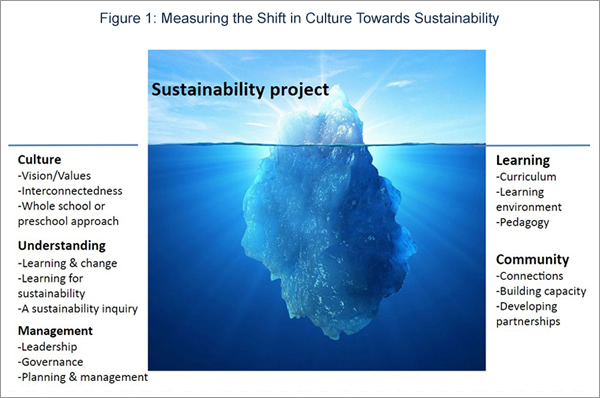
Figure 1: Measuring the Shift in Culture - reporting processes have changed to include not only the project (output), but the rich stories of transformation taking place in (pre)schools, under five key headings: Culture, Understanding, Learning, Management and Community
Using the Core Indicators tool, NRM Education staff are supporting (pre)schools to develop goals to achieve indicators under five categories: Culture, Learning, Understanding, Management and Community. This is providing a measure of the impact our program is having in the (pre)school and its community.
This method of measuring program impact is seen as innovative; during 2016 the process was commended during conference presentations in both Australia and the United States of America.
The Core Indicators are currently our best tool for evaluating the progress (pre)schools are making in embedding EfS into their cultures for capturing those social and cultural outcomes, and for guiding our team to support and inspire those we work with.
To track a shorter term level of achievement in relation to social change, we are also documenting achievement of ‘progress’ relating to individual cells in the core indicators.
Figure 2 shows the progress made over the last 12 months:
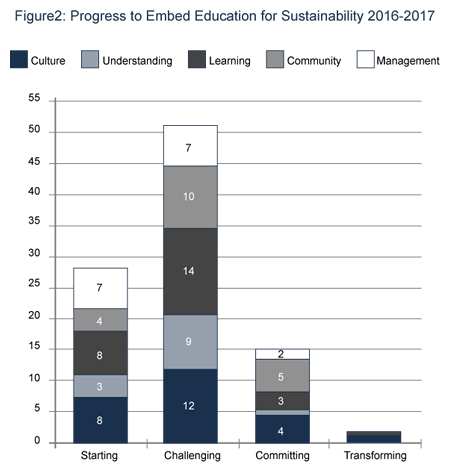
Figure 2: Progress to Embed Shift in Culture Towards Sustainability - Culture is the overarching element. Indicators are organised into four stages: Starting - (pre)school recognises need for change, Challenging - (pre)school is actively involved in challenging current practices, Committing - EfS is being embedded into the life of the school, Transforming - the (pre)school, with its communities is continuously learning for and living sustainable lifestyles.
As we are in the initial stages of collecting this data, not all AuSSI-SA registered (pre)schools have had their baselines measured – but initial progress is looking promising. Within the Central region, so far, thirty-five (pre)schools have reported on ‘progress to embed EfS’.
The greatest progress is being made in the “challenging” stage, particularly in the learning and understanding elements – easier shifts in culture seem to be in linking in the curriculum. Nine schools have completed thirty-four indicators (between them) making a shift along the AuSSI Rubric to the next stage (from starting to challenging, committing to transforming etc.). These 35 sites have made progress towards a further total of 66 indicators. i.e. they are progressing an indicator but have not yet fully completed it.
We look forward to collecting baselines for all the Culture and People (pre)schools we work with over the next 12 months to get a clearer sense of the shifts taking place as (pre)schools transition to one where Sustainability is embedded into everyday practice.
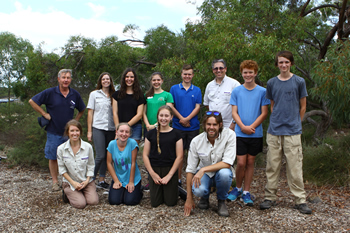
NRM staff with 2017 Youth Environment Council Mentors at the annual mentor training camp
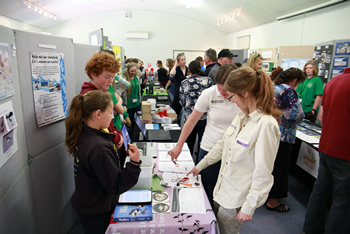
Dani Austin listens to YEC students present at the Sharing and Celebration Forum
